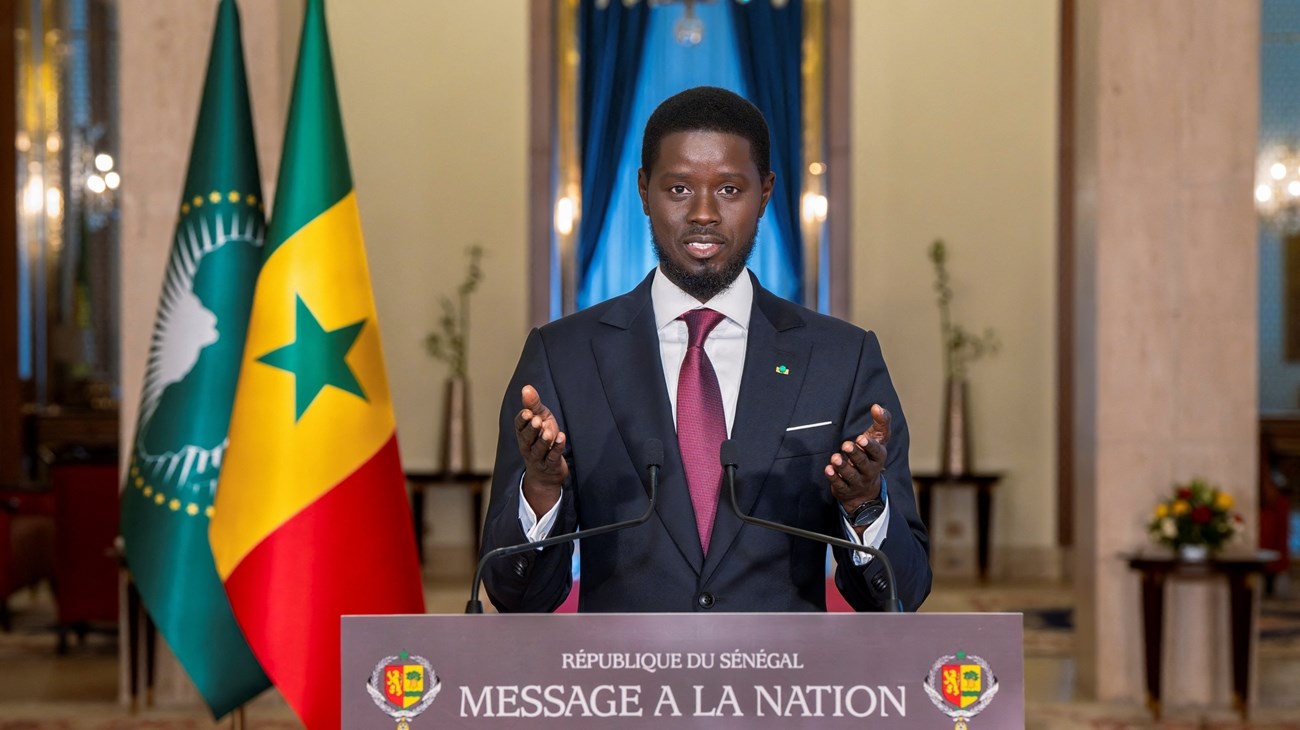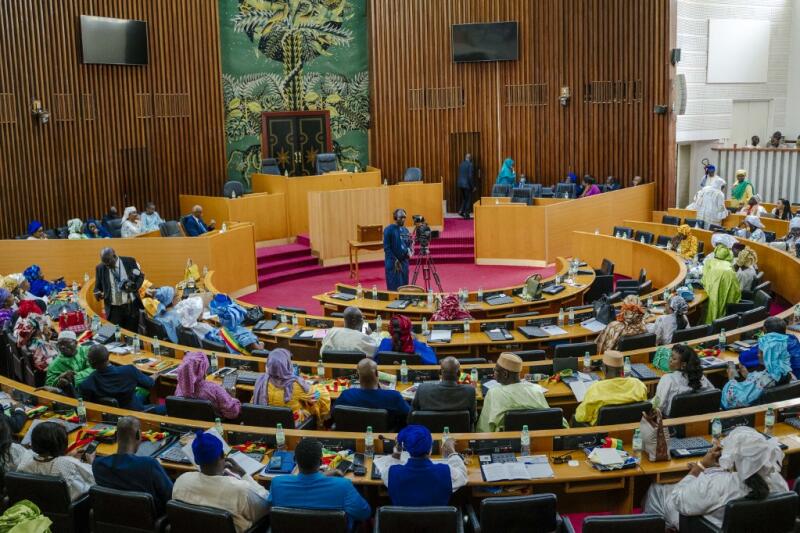Senegal's Government Faces Parliamentary Rebuke: Are Early Legislative Elections Ahead?

“The dissolution of parliament is now certain.”
Senegalese President Bassirou Diomaye Faye suffered a setback in parliament after his constitutional amendments were rejected, as early legislative elections loom to secure a pro-government majority.
On September 2, 2024, the National Assembly of Senegal (the parliament) rejected a bill proposed by President Diomaye Faye’s government, which aimed to introduce a constitutional amendment to abolish two constitutional institutions.
The amendment sought to eliminate the Economic, Social, and Environmental Council (CESE) and the High Council of Regional Governments. The bill only gained 80 votes in favor, with 83 against, while the constitutional amendment required 99 votes to pass.
Following this vote, the president, who was elected in March 2024, and his Prime Minister Ousmane Sonko, found themselves without a majority in the National Assembly to implement their policies and election promises.
According to the government, abolishing the two institutions could have saved 15 billion CFA francs, equivalent to slightly more than $25 million.
Senegal faces an unprecedented situation, with the opposition holding a majority in the National Assembly, outpacing the president and the government. This signals potential political developments as the country navigates this new reality.
Presidential Rejection
The Senegalese presidency swiftly reacted to the parliament’s vote, issuing a statement saying that “the National Assembly’s rejection of the bill to amend the constitution indicates a deep-seated majority’s disconnect from the popular aspirations widely expressed during the last presidential election.”
On September 3, 2024, the presidency posted on Facebook, “The bill to revise the constitution included presidential directives aimed at rationalizing public spending, which the government intends to implement under the principle of transforming public governance outlined in the bill.”
The statement reaffirmed President Diomaye Faye’s commitment to working towards “expressing the pluralistic political positions necessary for a balance of powers.”
The Benno Bokk Yaakaar coalition, formed around former President Macky Sall, retains a relative majority in the National Assembly elected in 2022, despite the loss of executive power.
The proposed bill has sparked divisions and debates in parliament as well as among citizens on social media. Some pointed out that the two institutions targeted for dissolution are headed by relatives of former President Macky Sall, while others noted that their abolition was one of the president’s campaign promises.
Reacting to these developments, opposition MP Abdou Mbow promised to submit a no-confidence motion to bring down Ousmane Sonko’s government.
Prime Minister Sonko responded by stating that the new government should dissolve parliament in the coming days and hold “dozens” of individuals accountable in the name of fighting corruption.
“I can assure you that there will be no no-confidence motion against the government; these individuals will have other things to do besides being deputies,” Sonko added, as reported by VOA Africa on September 4.
“The discussion on accountability [...] will begin now, this very week.”
Sonko also mentioned that his government plans to present a “new general policy” in September, which outlines a vision for the next five and ten years, extending to 2050. He emphasized that the government is committed to rationality and integrity as core principles for the use of public funds.
Sonko declared, “We will have zero tolerance for corruption.”
Under Senegal’s system, President Diomaye Faye and Prime Minister Sonko require a parliamentary majority to implement the reform policies they promised. However, the ongoing rift between the government and the opposition is obstructing the administration's work.

Under the constitution, the president can dissolve the assembly, but not before two legislative years have passed.
The press, citing the Constitutional Council’s opinion sought by those in power, reported that President Diomaye Faye would be able to take action starting from September 12, 2024.
The Senegalese prime minister has yet to deliver the general policy speech (the government program) before the assembly.
Meanwhile, Macky Sall announced the dissolution of the Benno Bokk Yaakaar coalition, which had been in power for 12 years.
The former Senegalese president justified this decision in a press statement, emphasizing the need to learn “lessons from the ballot box,” referring to his bitter defeat in the presidential election.
According to Africa News on September 3, 2024, the former head of state stressed the need to organize better in response to “the challenges of the moment,” signaling readiness for the upcoming legislative elections, which seem to be on everyone’s mind.
Member parties of the coalition, including the Socialists and the People's Liberation Front, expected this dissolution, as Macky Sall’s party, Alliance for Republic (APR) had already reached out to the liberals for a new alliance, and because Sall is currently residing in Morocco and doesn’t seem ready to return to Senegal.
Assessing the Situation
Political analyst Hamidou Anne believes that “the dissolution of Senegal’s parliament is now certain, following President Diomaye Faye’s setback in parliament.”
Speaking to Al-Estiklal, Anne stated that “the battle over dissolution is nearing its end, with everyone convinced that the president will dissolve parliament when it turns two years old on September 12.”
However, Anne added, “It is not certain that the ruling party will win the early legislative elections that will soon follow.”
He observed that the opposition is “paying the price for its strategy of not dismissing the prime minister, as he refused to present his general policy before the National Assembly.”
“The opposition, along with a significant portion of the population and civil society, felt this was disrespectful to parliament and its deputies. In response, the opposition rejected the bill and made its decision to challenge the government.”
“With the dice already cast, it’s natural that a presidential decree dissolving the National Assembly will be issued on September 13, calling for early legislative elections. The government will have between 60 and 90 days to organize them, which means mid-November to mid-December,” the political analyst added.
Anne pointed out that “this dissolution will affect the budget vote and the candidate selection process,” but, he added, “Its political impact will not be too significant, given that Senegalese democracy demonstrated its deep roots in the last presidential election on March 24.”
Regarding the balance of power in the upcoming parliament, Hamidou Anne emphasized that it is difficult to predict who will win the elections. However, in general, the electoral battle will be intense between all parties, and the people will have the final say, as they are “the ultimate judge.”

Communication and media expert Hamadou Tidiane Sy believes that “the disagreement between the two parties is not over a comprehensive constitutional amendment but a partial one.”
Tidiane Sy told Deutsche Welle (DW) on September 3, 2024, that the government argues that these institutions have large budgets and that those resources could be used for other purposes.
He pointed out that “the opposition rejected the amendment for two reasons: first, they are awaiting the prime minister’s general policy statement, which has yet to be issued; second, this reform should coincide with other election promises to rationalize expenditures or the budget.”
“The opposition also pointed to certain funds, particularly the political funds of the president and ministers, which they claim indicate that the push to dissolve the two institutions is primarily political in nature.”
“The fact that the president introduced a bill and it was rejected by parliament shows that democracy is functioning and that there is a separation of powers. In any case, we can say that there are different institutions, each with its own specific powers,” Tidiane Sy concluded.












